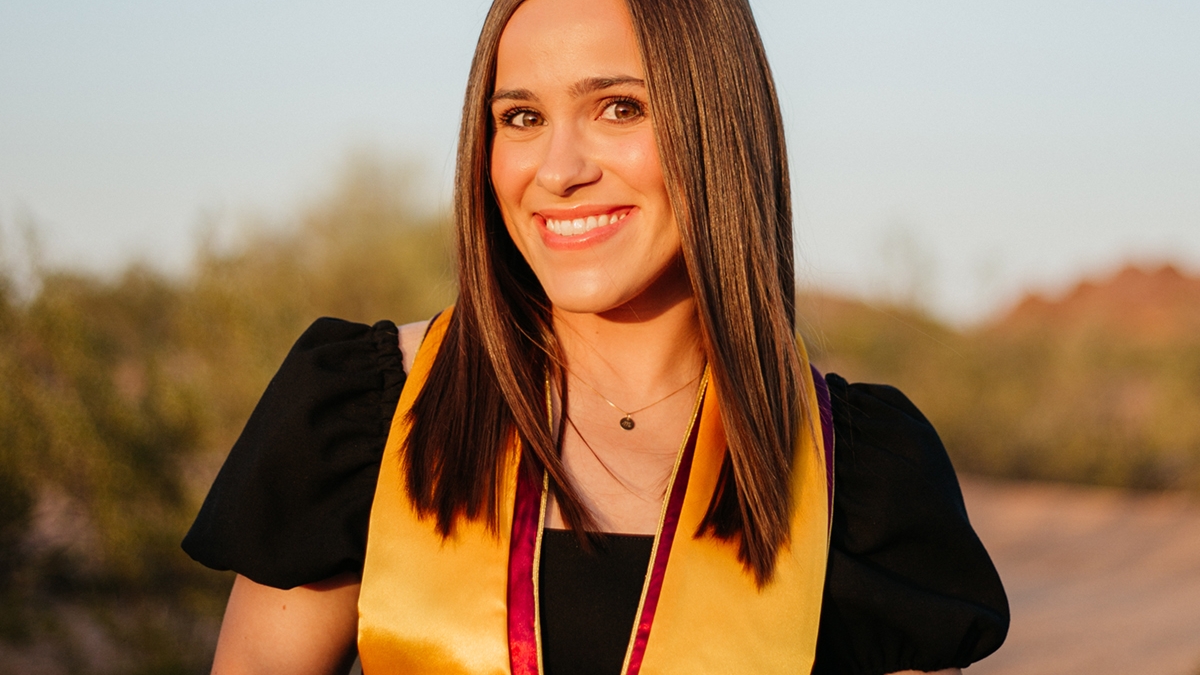Editor's note: This story is part of a series of profiles of notable spring 2022 graduates.
Her study abroad session may have been cut short due to the pandemic, but Macey Sierka will never forget the four weeks she spent in Paris and how it further fueled her passion to start her own clothing business upon graduation.
Sierka will graduate this May with a degree in supply chain management from the W. P. Carey School of Business with a minor in fashion from the Herberger Institute for Design and the Arts.
During her study abroad experience, she took a course called “Business and Fashion in France” where she learned about the business aspect of the fashion industry from the perspective of luxury fashion brands. She gained several perspectives about fashion from her professors who were knowledgeable in areas including design, marketing and forecasting.
“I have always loved clothes, but really fell in love with the industry after this course,” said Sierka. “I spent countless hours window shopping and visiting fashion museums in Paris to try and absorb as much knowledge and inspiration as possible. To be able to learn about the industry in one of the world’s fashion capitals was a dream, and it made me realize what I wanted to pursue as a career.”
When applying to colleges, the Chandler, Arizona, native focused heavily on applying to schools in California as it had been a dream of hers to live there. However, once she began comparing large public universities and smaller private schools, she realized ASU had it all.
“What I loved about ASU was that I could experience all of the opportunities that came with attending a large public research university, but still have a smaller community to call home with Barrett, The Honors College,” said Sierka.
In addition to finding her community, she appreciated ASU’s charter and authentic commitment to diversity.
“During high school, I attended so many information sessions and tours of colleges that claimed they valued diversity, but had acceptance rates in the single digits,” said Sierka. “Many of these schools admitted that they were able to hand-select students in a way which they felt would make them look ‘most diverse.’ What I have always loved about ASU, especially as I have been able to meet such incredible people throughout my college career, is that the university accepts each student for who they are – no one is excluded. To me, that is true diversity.”
Sierka started at W. P. Carey as a business entrepreneurship major envisioning that would give her holistic business knowledge. However, after her first course, she found it wasn’t exactly what she was expecting. In January 2020, she changed her major to supply chain management as it is a highly ranked program.
“I not only ended up loving all of my courses, but was able to study something that is more relevant than ever,” said Sierka. “It has been so exciting to discuss the timely supply chain news with my professors who can provide such valuable insight on the topic.”
Sierka acknowledges that she has been fortunate to have many amazing professors throughout her time at ASU, but one course she will not forget was her first supply chain course taught by Professor Craig Carter.
“Prior to his course, I admittedly thought of sustainability to be the antithesis of capitalism,” Sierka said. “I always believed efforts to protect people and the planet to be at the sake of profit. His expertise in sustainability and the concept of the triple bottom lineThat is, focusing not just on financial performance but on social and environmental impact as well. completely changed my perspective, and made me realize that firms can actually improve their profitability by acting ethically.”
Sierka spent a lot of time developing her thesis for Barrett, The Honors College, where she wrote a business plan for her sustainable and luxury pajama and loungewear brand. The inspiration for her thesis stemmed from Carter’s lesson on sustainability. She plans to make the concept of the triple bottom line a focus in building her sustainable business.
As she begins taking this next step to launching her brand, she looks back at her time at ASU and believes she would not be prepared for this next venture if it weren’t for her experiences learning about business and fashion and the people she met.
“Starting a business can be scary, but all of the professors I have worked with on my business plan, particularly professors Katy Keane and Cindie Blackmer, have encouraged me to follow my dream,” said Sierka. “I feel so proud to be graduating from a university which values entrepreneurship and has encouraged me to pursue my passion, despite my postgraduate plans being somewhat unique.”
In her time at ASU, Sierka received the New American University Scholar – President’s Award, Steve Brabec Scholarship, William Feldhorn Family Scholarship and the Study Abroad Office Scholarship.
More Environment and sustainability

ASU prof turns trash into treasure
The Research Corporation for Science Advancement, or RCSA, regularly hosts a series of discussions known as Scialog, a…

Best outdoor experiences are shared and build connections, recreation professor says
Steve Sassaman doesn’t really need to tell you he’s an outdoorsman. One look at his full, dark beard gives a vibe that clearly…

ASU offers new project-based courses for global leaders of tomorrow
Addressing complex challenges requires innovative solutions.This is why the College of Global Futures — with its four academic…
